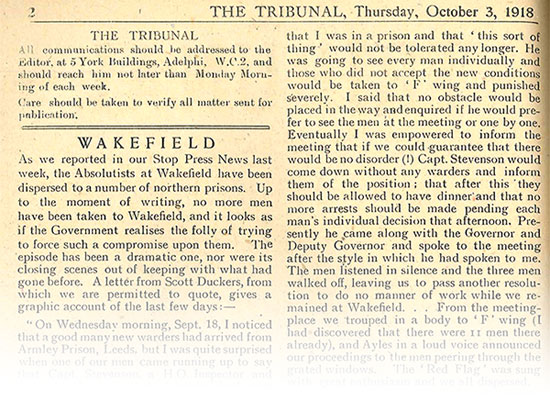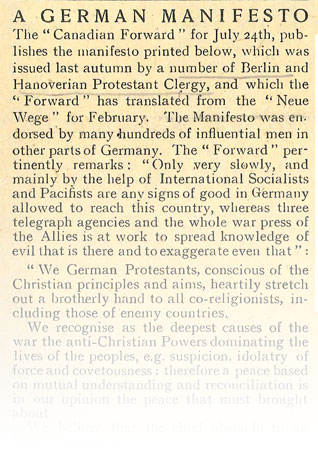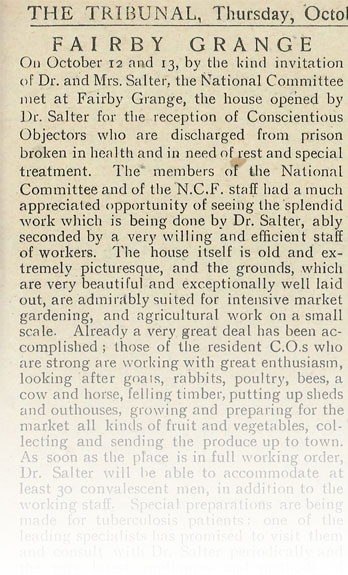
| HOME | TRIBUNAL HOME |
October 1918
While the farcical Wakefield Experiment had dominated September, October saw the Tribunal take a wider view of the situation once again. Articles range from updates on individuals, to discussions of the form a peace should take, and how to move onto a “war against war” afterwards.
The review this month focuses on the Tribunal’s reports on Germany, but it was not a month without personal sorrow for Conscientious Objectors and their supporters. From October onwards, the number of CO deaths reported in the Tribunal would increase, month by month by month. From the ones and twos of previous reports, with their full obituaries and personal remembrances would come casualty lists as the flu pandemic took hold of prisons and work camps everywhere in Britain.
In October, the deaths of William May, Arthur John Slater and Albert Rudall were reported in the Tribunal. | more
3rd October: Wakefield
The Wakefield Experiment, though well and truly ended by the Manifesto of September, had not yet shuddered to it’s final ignominious halt when the Tribunal was published on the 26th. After presenting the Governor with the manifesto outlining the absolute refusal of any of the COs to agree to the latest government plan, the men were allowed to contemplate their position for an afternoon - along with one last communal meal. Scott Duckers wrote to the NCF to finish the story:
“The men... passed another resolution to do no manner of work while we remained at Wakefield... In the evening I joined in the procession past the Inspector, who asked us individually whether we would accept the new conditions. One of the 102 at the meeting changed his mind, but 101 of us were escorted over to F wing... I was put in a cell which contained nothing whatever except the dirt of years.”
Back to prison for all the men at Wakefield. The ringleaders of the group were separated into different prisons and, a whole three weeks after the experiment had begun, the Tribunal reported that “the curtain was rung down on the great Keep-Awake-Field drama”
3rd October: A German Manifesto
Reporting absolutely any news of the peace movement or pacifists in Germany had been a feature of the Tribunal from its earliest publication, and as rumblings of social change, dissent and even possible revolution in Germany slowly made their way to Britain,
The “German Manifesto” was an old piece, either unknown to the Tribunal until this point, or filtered through international news sources where British ones would not print it. In either case, it shows a Christian approach to universal peace, one echoed in the Peace Movement in Britain throughout the war. It repudiates war and violence, not just by the “other side” but by their own nation, and calls for peace built on Christian principles.
The NCF were always eager to show that pacifism and a desire for peace were international. Reporting on Conscientious Objectors and peace movements from around the Entente countries showed clearly a common struggle and demand for peace, and, though often delayed and censored, such reports were readily available. What the NCF lacked was a consistent voice from “the other side”. With the dominant narrative of the war (still one some hold today!) being peace-loving Britain defending innocent Belgium against the war-maddened hordes of Germany, printing pacifist voices from Germany was extremely important. There were people on both sides working for peace, and being persecuted for it not by the “enemy” but by their own nations.
17th October: Sedition in German Army
The NCF was careful to preserve it’s status as a non-sectarian, though socialist-aligned, 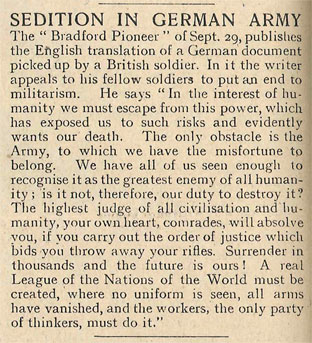 organisation, and anyone who has read through these review articles since the beginning (thanks!) would not be surprised that a report on political opposition to the war in Germany followed on from the above. Whether happy circumstance or deliberate design, the Tribunal was able to put forward another very familiar anti-war view from a more unusual source - translation of German socialist propaganda leaflets:
organisation, and anyone who has read through these review articles since the beginning (thanks!) would not be surprised that a report on political opposition to the war in Germany followed on from the above. Whether happy circumstance or deliberate design, the Tribunal was able to put forward another very familiar anti-war view from a more unusual source - translation of German socialist propaganda leaflets:
“In the interests of humanity we must escape from this power, which has exposed us to such risks and evidently wants our death. The only obstacle is the Army to which we have the misfortune to belong. We have all of us seen enough to recognise it as the greatest enemy of all humanity: is it not therefore our duty to destroy it?”
Not simply a theoretical discussion of socialist revolution this, as it continues:
“Surrender in your thousands and the future is ours! A real League of Nations of the world must be created, where no uniform is seen, all arms have vanished, and the workers, the only party of thinkers, must do it”
Though the Tribunal had printed controversial material before, it was rare to have anything as strident (and practically-inclined) as this in the pages. Far from being their own work, even the translation was a reprint of an article in the Bradford Times. Revolution, it seemed, could be preached in British newspapers - just so long as it was happening to someone else.
24th October: Fairby Grange
As it was clear - and not only from the apparently increasing unrest in Germany - that the war was entering it’s final stages, preparations began to be made to cope with the discharge of Conscientious Objectors. Correctly foreseeing that no support would be given to the government, either to rehabilitate men who had been imprisoned since 1916, or medical support available to anyone whose health had been broken by prison, or the Home Office Scheme, members of the Peace Movement took it upon themselves to make sure that COs leaving prison could recover in a supportive environment.
Alfred and Ada Salter, a quiet but key part of the peace movement since the early days of conscription and before, set up a convalescent home at considerable cost and effort; Fairby Grange. Initially to be a rest home for returning COs, it would expand to summer camps for city children, cooperative farming and more, run by the Salters and the formidably organised Bermondsey ILP. Reports from Fairby Grange would be rare over the remainder of the Tribunal’s print run, but letters (and the handwritten magazine produced there “Some Kid”) show that “cheerful cooperation and loving comradeship” were the orders of the day. It was a much needed support for the COs that found their way there after release, and adds another merit to the record of the Salters.
31st October: Liebknecht is Free
All the buildup of anti-war rumours in Germany 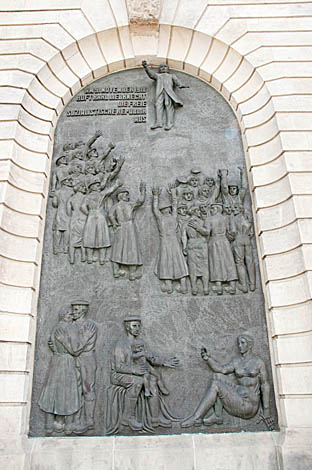 culminated with The Tribunal’s most triumphant front page of the entire war: Karl Liebknecht, peace campaigner, socialist, hero to many in the NCF, had been freed from prison where he had been since May 1916 for anti-war activity. Not only would this have been cheering news to the peace movement in Britain, but it also handed a stunning opportunity for propaganda. Germany, that supposed terror, bent on militarisation and enslaving the free peoples of Europe, had freed it’s arch political prisoner, the figurehead of the anti-war movement. Britain, on the other hand, still held thousands of men for the same crime.
culminated with The Tribunal’s most triumphant front page of the entire war: Karl Liebknecht, peace campaigner, socialist, hero to many in the NCF, had been freed from prison where he had been since May 1916 for anti-war activity. Not only would this have been cheering news to the peace movement in Britain, but it also handed a stunning opportunity for propaganda. Germany, that supposed terror, bent on militarisation and enslaving the free peoples of Europe, had freed it’s arch political prisoner, the figurehead of the anti-war movement. Britain, on the other hand, still held thousands of men for the same crime.
While the Tribunal’s front page crowed and behind the scenes (and in prison) there was celebration at the news, it changed nothing for either the Absolutists in prison nor the Alternativists at home and abroad. Surprisingly, even the next month would see little change in their circumstances - armistice or no.
Liebknecht memorial Berlin 2018
Clink on images to enlarge
